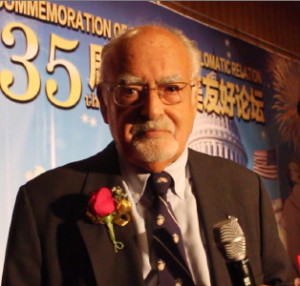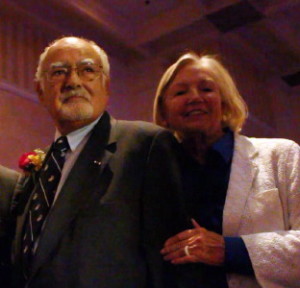address, as written, to the Forum “35 Years of Building Peace: The Growth of US-China Diplomatic Relations”; August 17, 2014 at the Pasadena Hilton, Pasadena, California
Preamble
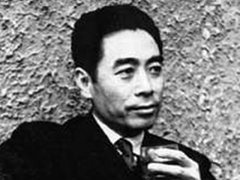 As we are all here, in part, to honor the memory of Zhou Enlai, I would like to read to you a description of the man by one of the few Americans to know and understand China, certainly then and unfortunately perhaps still now, the Honorable John Service.
As we are all here, in part, to honor the memory of Zhou Enlai, I would like to read to you a description of the man by one of the few Americans to know and understand China, certainly then and unfortunately perhaps still now, the Honorable John Service.
“He is a very talented, convincing diplomat. He has a glow, and attracts people by the force of personality. His mind is sharp; he is strong-willed, and has well-organized ideas. He tried to make us agree with his views about China and the world — and he is convinced of these views. He did so with calm reasoning, clear words, gentle conversation, and with an extensive knowledge of history and the facts of the world; he has an amazing memory for detail. People are persuaded, but not intimidated, nor are they blamed if they hold different views.”
– Interview with John Service
Peace and Profit
Arthur Lipper
In a world becoming unstuck socially — due primarily to income and wealth disparity — the topic of this talk, “Peace and Profit”, seems appropriate.
Terms have to be defined for there to be an intelligent conversation. Is peace simply the absence of conflict in a given geographic area? One would be hard put to identify a period of time when there were no conflicts going on some location. Conflicts have common causes — economics, control of territories and natural resources, religious beliefs — and conflicts managed by those who profit from the support of armed forces. Historically, it seems that those who control military power have the leverage necessary to control many outcomes.
In some cases, conflicts are successful for one side — hardly ever for both. In all of the conflicts there are painful human combat casualties, both of combatants, their families. We have come to describe these as “collateral damage”, a term which justifies the mission of the combatants.
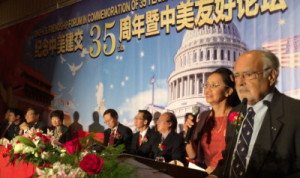 Conflicts also cause economic disruption, frequently for both sides. However, in many cases, there are those who profit directly and/or from the results of the conflict. There is the so-called military–industrial complex, including those who are the manufacturers of weapons and those involved in the necessary post-hostility reconstruction. World War II was terrible for many businesses, except if your company made earth movers or textiles. Conflicts create shortages, and shortages justify premium pricing, allowing for large profit margins.
Conflicts also cause economic disruption, frequently for both sides. However, in many cases, there are those who profit directly and/or from the results of the conflict. There is the so-called military–industrial complex, including those who are the manufacturers of weapons and those involved in the necessary post-hostility reconstruction. World War II was terrible for many businesses, except if your company made earth movers or textiles. Conflicts create shortages, and shortages justify premium pricing, allowing for large profit margins.
Dealing with the aftermath of destruction often becomes progress, as evidenced by the rebuilding of cities. Although the replacing of old with new may be desirable for future generations, we can predict the answer to the question, which could be posed to inhabitants of devastated communities, as to whether they would make the trade of destruction of what they had had for the progress. The loss of life and property is and has always been the result of the absence of peace for some people, somewhere.
Those who study the past can recognize patterns that may indicate the likelihood of future wars. some people want to decrease the prompts for war, even if it brings them no direct personal benefit. These are the peacemakers we are here to honor and find a way of emulating. It is this hope — to be effective peacemakers — which brings us all here tonight.
Xiao Fang Zhou and Michael North have dedicated their lives to the understanding and teaching of the beliefs and vision of Xiao Fang’s grand uncle Zhou Enlai through the creation of the Zhou Enlai Peace Institute. Respecting their recognized integrity and ability, I accept their vision of the man and his ideals. Nevertheless, as wars seem to be a recurring historical pattern — is there really anything which can be done to help in the peacemaking process?
Recognizing that the technology of killing and physical asset destruction has improved to the point where we have the ability to destroy life as we know it on this planet, something — in all of our best interest — should be done.
Before continuing and providing perhaps the only solution to the economic and therefore social problems of the world, I wish to suggest ways in which competitors, countries and companies can behave as Zhou Enlai would have approved for nations, and I believe for companies, using his Five Principles of Peace (1953):
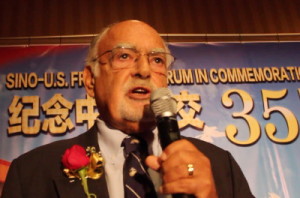
1. Mutual respect for each nation’s territorial integrity and sovereignty
It is both possible and constructive for companies who compete to also collaborate, to the extent permitted by law. Knowing one’s competitor well, and respecting his capability, is an advantage.
2. Mutual non-aggression
Competitors can agree as to how they will deal with each other, as well as with customers for whose business they compete.
3. Mutual non-interference in each other’s internal affairs
Competitors can agree not to aggressively solicit each other’s employees. I believe that all employees should be required to execute confidentiality and Non-Disclosure-Agreements. Intellectual property should be protected.
4. Equality and mutual benefit
Treating a competitor with respect, and learning the problems faced by competitors, can be highly constructive. Having the knowledge of the problem is, in of itself, an advantage.
5. Peaceful co-existence
Competition can be fierce without being ugly. It is possible that, with a sharing of information, the problems of the competitors can be lessened.
To use an American expression indicating a solution, there is a Silver Bullet. That Silver Bullet, ironically described for this subject, is education — leading to an improvement in the economic environment for all. This is not to suggest that education for all will create wealth for all. Family, heritage, economic circumstance and serendipity play too large a role in wealth creation for that to be the case.
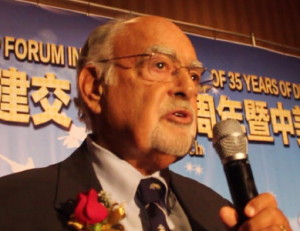 However, it is more likely there will be peace in areas where there is an improving level of education, which allows those with skill and motivation to achieve relative life-style improvement within their environment. Due to today’s technology, education for all is now possible, since we are beyond the limitations of specific location-focused schooling. Today, we have the tools to provide education to those seeking self-improvement and better lives wherever they are located. As long as there can also be economic opportunity for the newly educated, it is a win/win situation. The downside is that without opportunity for the newly-educated there will be frustration and predictable political discontent.
However, it is more likely there will be peace in areas where there is an improving level of education, which allows those with skill and motivation to achieve relative life-style improvement within their environment. Due to today’s technology, education for all is now possible, since we are beyond the limitations of specific location-focused schooling. Today, we have the tools to provide education to those seeking self-improvement and better lives wherever they are located. As long as there can also be economic opportunity for the newly educated, it is a win/win situation. The downside is that without opportunity for the newly-educated there will be frustration and predictable political discontent.
Everyone, worldwide, should be able to understand money and how money is made. They should also understand compound interest and the related benefits of saving. They must also have an ability to communicate in the 21st century, both locally and internationally. We are the beneficiaries of English becoming so widely spoken, or at least understood. The Internet and social media have played and will continue to play an increasing role in the development of individuals and communities. There is more of value in Africa than just natural resources, if the people resource is developed. A reflection of this is the fact that Africa is currently the area of fastest hotel growth.
It’s pretty simple. When people earn, they spend. A world of people having more money to spend will result in more profit for those having something to sell, even if it is but their own labor.
Therefore, the more fortunate have a vested interest in the economic well-being of all on the planet. It is unlikely that international economics will ever allow a sufficiently rapid worldwide economic development and resulting relevant universal education to resolve all issues. It is my hope that early education will focus on teaching young children how to think using deductive reasoning and how to obtain and use data, rather than the traditional approach of using an individual’s memory as the basis for information transfer. Yes, one should know how to do arithmetic, but more important is understanding how to get and use the answer to a question or task requiring calculation. Doing the calculation is less important than making use of the answer.
There will always be those competing with others for power, assets or the promotion of beliefs. My premise is that when people have a decent and better life, as a result of effort and education, they will be less willing to surrender it for an abstract ideology or cause.
We are all at increasing risk to mindless extremists, willing to be the sacrificial tools of those seeking a reward in a heaven never to be known or entered.
We will all do better in a peaceful world.
Thank you.
By Arthur Lipper, Advisor to the Zhou Enlai Peace Institute,
For presentation at the Celebration and Forum:
“35 Years of Building Peace:
The Growth of US-China Diplomatic Relations”
held August 16 and 17 at
Hilton Pasadena, Pasadena, CA
also available in Mandarin translation
*
Arthur Lipper, Co-Founder
Pacific Royalties Inc.
858 793 7100 – artlipper @ Skype
ArthurLipper@gmail.com
For further reflections on related themes, please see:
Do Good, Do Well (San Diego Reader, August 2014

